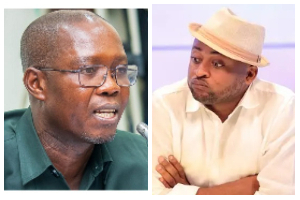: Pupil teachers must still be recruited
GES must still employ pupil teachers and the academic performance of pupils taught by such ‘pupil teachers’ is most likely to continue becoming poorer and poorer. The reason for these odds is obvious: overpoliticizing of the educational sector. By default, political parties use their manifestos to amend our educational policies.
The educational sector has been overpoliticized to an extent that a ‘school’ must be established at every community, regardless of its population or its proximity to nearest one. This politically motivated practice comes at a time when trained or professional teachers are becoming ‘rarer’. A common mistake is for people to say that teachers are many. The mistake is a genuine. First, because in Ghana, anybody can be called upon to teach in any pre-tertiary institute, both private and public. A good example is the pupil teachers in the public sector who were employed under the National Youth and Employment Programme (NYEP) now GYEEDA. Thus, who a teacher is or whether teachers are professionals is another issue. Second, because the number of teachers keeps increasing on yearly basis.
But what is the reality? The number of pupils/students continuously increases at a rate far more than that for teachers churned out annually, making the teacher–pupil ratio too large. Also, many of the newly trained teachers never assume post. Finally, teachers leave the profession at an unquantifiable rate (eg, nearly all the MPs and DCEs are/were practising teachers). And why the mass exodus? This document can never answer this question. Thus, any commodity or service is only in excess when its supply exceeds its demand. Mere increase in number of teachers does not make teachers more than they are needed. In fact, the deficit is too huge that many schools just have one or two teachers to handle class 1 up to JHS 3.
We return to the very issue: ‘why GES must still recruit pupil teachers in the 21st century’. At first, schools were built on catchment basis, where a central community either because of its accessibility or because of its population was chosen as the location for building a school. Students from the surrounding villages/communities attended such a school. This approach was the best. The reason is that no parents, both then and up to-date, merely want their children to attend school, but they want their children to be educated. And to be educated implies a cost on the part of both the child and the parents. And the cost borne by children here was to walk to the catchment school. Hence, pupils/students of those days were really students, receiving education in all spheres of lives—having to wake up early, to bath, to walk, to manage little food and hunger, etc.
Common sense suggests to us that when we (the nation Ghana) feel that every community must have its own school, we must have trained sufficient number of teachers for all new schools that we are opening. The question is ‘Do we open a new school at a community for children to be attending whilst looking for teachers, or we organize the two activities concurrently? In Ghana, what do we see? The former.
Politicians will rush to build schools in every village without first considering teachers who will handle the pupils. And once the school is built usually at these sparsely populated areas where there is no possibility of ever getting up to 20 students per class, GES is coerced into getting ‘teachers’ to such locations. Here, GES often has no option but to look for ‘engagers’ to go and manage the students. After all, it makes sense to have any normal adult ‘to guard and/or guide’ the pupils rather than to leave them alone.
But why is GES is not bothered so much about this situation? First, nearly every Ghanaian is so political in orientation that we appreciate everything said by our political leaders. Second, officers at GES are rest assured of the massive bribes they will receive during any pupil-teacher recruitment process and the ensuing percentages they will get when such persons are finally on the payroll. For this reason, GES is still claiming that persons faked results to be employed as pupil teachers when they (district and municipal directors) are those who preferentially employed the unqualified persons (see Part I). EOCO’s investigation into the fake-pupil-teachers’ scandal is a mere formality. And if anybody or group is to be incriminated, it will be GES (see Part I).
Govt too is not bordered about the teacher factor because it believes that anybody else can be sent to teach. To confirm this perennial governmental attitude, we refer to the so-called policy interventions geared towards improving education. Nearly every govt is boasting of introducing one of such programmes that are increasing enrolment (eg, Capitation Grant and School Feeding Programme by NPP & free school uniform by NDC). And more recently is the shameless fight over the initiator of the ‘fully free’ or ‘progressively free’ SHS. Amidst all these, have we heard of any policy to retain teachers in the field? Hmm! A man wants his wife to give birth to a bouncing baby, but he does not want to feed the wife properly! We shall see the kind of baby to be born. A lean one? Oh no? One with poor results. And why are you surprised about the poor results? Mere pretence!
The second point justifying that the govt bothers not about who teaches pupils is the cancellation of the teacher-trainee allowances. Here, GES and GNAT connived with govt to cancel the allowances. First, because teacher trainees are not the only professionals to-be who are receiving allowances—we have nurses and police. Why didn’t the govt cancel all such allowances?—Because the others are professionals and require the training before they can work. But because GES and GNAT feel that their members are non-professionals and can easily be substituted, cancelling their training allowances meant nothing. Effectively, a window is left wide open making it necessary for pupil-teacher recruitment to continue unabated.
In the face of the cancellation of the allowance, the govt keeps on deceiving itself that, the withdrawal of the allowances has increased enrolment at the teacher training colleges. Again, common sense suggests that not all those undergoing the training will end up in the classroom. Even those who were receiving allowances and were somehow bonded to assume post after completion, how many of them ended in classroom?
Again, lay reasoning suggests to us that every policy only works under certain conditions. And that failure to meet those conditions makes the policy a mere mockery. Returning to fake teacher issue (‘120 fake teachers dismissed’ (@ Ghanaweb 29/5/14), we remember vividly that govt phased out pupil teachers several years time ago. The question then is ‘were mechanisms put in place to ensure that adequate professional teachers are trained? This mechanism being the only condition that makes the phasing out of pupil teaching sensible. To the best of my knowledge, little was done to meet this condition. Frankly, if GES decides to reallocate all the professional teachers in the basic and second cycle institutions to all schools, the maximum number of teachers per school may just be 2 or even 1.
Justifiably, every community deserves a school, whether under a tree, in a shed or in a standard classroom block. But every-community-and-its-school policy must only come at time when the basic essentials for a school are met. Politicians appear to be unaware of ‘what a school is’. A school is that made up of a teacher and a pupil. Wherever they meet to teach and learn is a matter of convenience. Thus, merely putting up structures and commissioning them as schools meant nothing in educational sense if the pupils must go there and play without ‘teachers’.
Here, a teacher is not necessarily someone certificated to teach. In fact, some of the so-called pupil teachers are really clever and experienced. The problem therefore is the en masse and wholesale recruitment and the lack of mechanisms to ever produce sufficient trained teachers to match with the pupil population or the number of schools being commissioned on hourly basis. Listen to them saying ‘we have removed over 200 schools under trees’. And only to put the pupils into ultramodern classroom blocks where ‘fake’ pupil teachers abound. Extremely ridiculous!
What is the consequence of having the teaching field padded with these non-professionals? —Poor performance of pupils at BECE and beyond, for a bad foundation cannot support a stronger structure atop. Consequently, when govt, GES, parents and the general public complain about falling standards of education in Ghana, I laugh wickedly telling myself that we Ghanaians are unlikely to ever stop joking.—Because we all know the root cause.
However, poor academic performance needs not be entirely blamed on pupil teachers. Another obvious cause is avoidable policies that needlessly cause loss of contact hours in schools (expect Part III). Dropping a comment is part of your contribution towards laying a solid foundation for a children’s education. Long live practising teachers! Long live Kwame Nkrumah’s Ghana! Idris Pacas: 020 910 153 3
Opinions of Monday, 16 June 2014
Columnist: Pacas, Idris
Govt and GES pretend over fake teachers (II)
Entertainment













